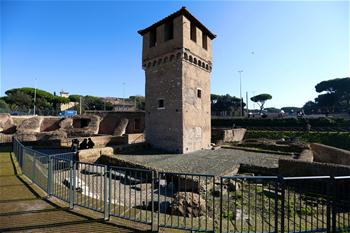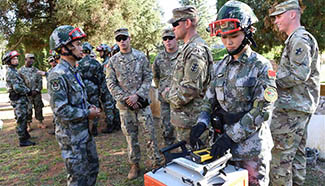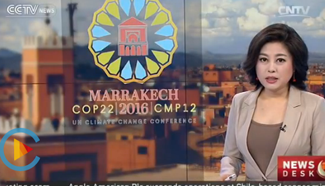URUMQI, Nov. 17 (Xinhua) -- Turpan City in northwest China has always been proud of its grapes, but now it is proud of its grape leaves too.
"Grape leaves were basically useless, either for feeding sheep or disposed as garbage. But now we sell several thousand tonnes of them to Greece every year," said Barai Yiburayim, manager of a dried fruit company in Turpan, Xinjiang Uygur Autonomous Region.
Barai, 68, was planting, processing and selling grapes for decades before his son connected him with Greek traders looking for grape leaves. He sent samples to Greece, and before long Greek buyers came all the way to Turpan.
The European guests examined Barai's grape leaves carefully and found the leaves met their requirements.
According to Barai, grape leaves become too firm in humid environments -- the drier the weather, the better the grape leaves. "Turpan is famous for its dryness and, naturally, raisins. So the grape leaves here have a good quality," he said.
Barai said plant diseases, insect and pests rarely strike their leaves thanks to the special climate in Turpan.
Grape leaves are widely used in a number of cuisines in many countries, including Turkey, Greece and Bulgaria. They are usually cured before being stuffed with a mixture of rice, carrot, onion, tomato and meat, when they are then steamed. Sometimes they are served in salads or eaten directly.
Barai has been doing business with Greek buyers for six years, and his yearly supply has jumped from two tonnes to 5,000 tonnes. The purchasing price has also increased to five yuan (70 U.S. cents) per kilogram from three yuan at the beginning.
Without affecting the growth of grapes, one mu of vineland (about 0.067 hectares) can produce 200 kilograms of leaves, yielding an extra 1,000 yuan income for growers.
As well as picking leaves on his own land, Barai purchases grape leaves from local grape growers. "The price of the leaves almost equals that of the grapes, so local growers show great enthusiasm," Barai said.
War and political turmoil have disrupted grape production and discouraged purchases of grape leaves in parts of Asia and the Middle East, which has increased dependence on Xinjiang, Barai said, adding that he plans to expand his business next year.
"I would like to build a factory producing dolmas - as Greeks call the stuffed grape leave rice dishes - here before exporting them," Barai said. "More added-value means more profits."










